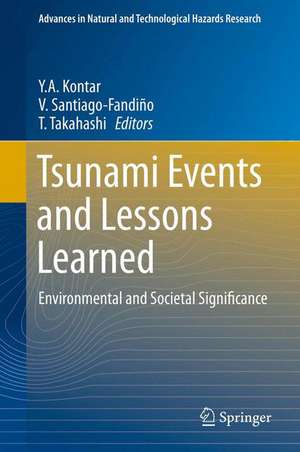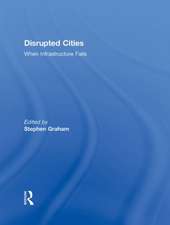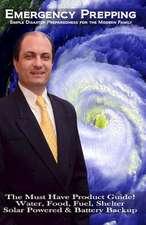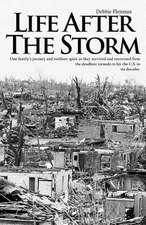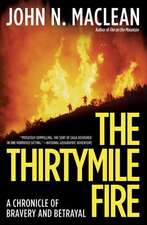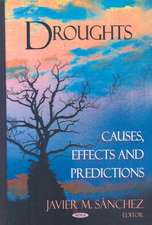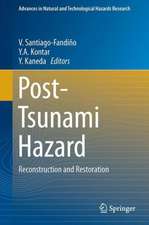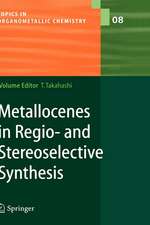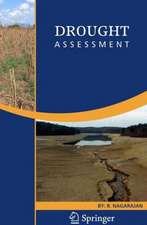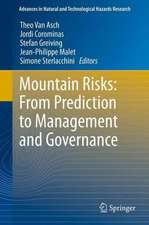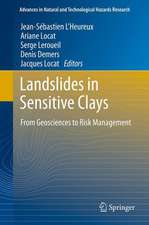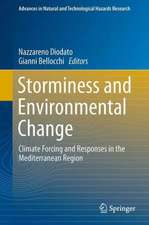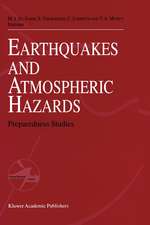Tsunami Events and Lessons Learned: Environmental and Societal Significance: Advances in Natural and Technological Hazards Research, cartea 35
Editat de Y.A. Kontar, V. Santiago-Fandiño, T. Takahashien Limba Engleză Hardback – 21 noi 2013
The book is aimed at experts, scientists and decision makers seeking recent updated information, knowledge and experiences to better understand, quantify, forecast and protect coastal water resources, ecosystems, communities and human settlements which are often affected by tsunamis.
| Toate formatele și edițiile | Preț | Express |
|---|---|---|
| Paperback (1) | 576.49 lei 38-44 zile | |
| SPRINGER NETHERLANDS – 23 aug 2016 | 576.49 lei 38-44 zile | |
| Hardback (1) | 652.31 lei 6-8 săpt. | |
| SPRINGER NETHERLANDS – 21 noi 2013 | 652.31 lei 6-8 săpt. |
Din seria Advances in Natural and Technological Hazards Research
- 18%
 Preț: 977.97 lei
Preț: 977.97 lei - 18%
 Preț: 921.15 lei
Preț: 921.15 lei - 18%
 Preț: 1406.35 lei
Preț: 1406.35 lei - 18%
 Preț: 788.72 lei
Preț: 788.72 lei - 15%
 Preț: 643.84 lei
Preț: 643.84 lei - 18%
 Preț: 955.56 lei
Preț: 955.56 lei - 18%
 Preț: 954.31 lei
Preț: 954.31 lei - 18%
 Preț: 958.56 lei
Preț: 958.56 lei - 18%
 Preț: 937.56 lei
Preț: 937.56 lei - 18%
 Preț: 952.72 lei
Preț: 952.72 lei -
 Preț: 382.18 lei
Preț: 382.18 lei - 15%
 Preț: 647.92 lei
Preț: 647.92 lei - 18%
 Preț: 948.47 lei
Preț: 948.47 lei - 15%
 Preț: 640.06 lei
Preț: 640.06 lei -
 Preț: 407.01 lei
Preț: 407.01 lei - 15%
![Submarine Mass Movements and Their Consequences [With CDROM]](https://i4.books-express.ro/bs/9781402012440/submarine-mass-movements-and-their-consequences-with-cdrom.jpg) Preț: 604.37 lei
Preț: 604.37 lei - 15%
 Preț: 643.48 lei
Preț: 643.48 lei - 15%
 Preț: 648.05 lei
Preț: 648.05 lei - 18%
 Preț: 1236.99 lei
Preț: 1236.99 lei - 18%
 Preț: 947.35 lei
Preț: 947.35 lei - 18%
 Preț: 947.35 lei
Preț: 947.35 lei - 18%
 Preț: 966.15 lei
Preț: 966.15 lei - 15%
 Preț: 642.51 lei
Preț: 642.51 lei - 18%
 Preț: 951.29 lei
Preț: 951.29 lei - 18%
 Preț: 1255.16 lei
Preț: 1255.16 lei - 15%
 Preț: 642.51 lei
Preț: 642.51 lei - 15%
 Preț: 646.43 lei
Preț: 646.43 lei - 15%
 Preț: 635.96 lei
Preț: 635.96 lei - 18%
 Preț: 1244.08 lei
Preț: 1244.08 lei
Preț: 652.31 lei
Preț vechi: 767.42 lei
-15% Nou
Puncte Express: 978
Preț estimativ în valută:
124.82€ • 130.65$ • 103.89£
124.82€ • 130.65$ • 103.89£
Carte tipărită la comandă
Livrare economică 01-15 aprilie
Preluare comenzi: 021 569.72.76
Specificații
ISBN-13: 9789400772687
ISBN-10: 9400772688
Pagini: 280
Ilustrații: XIII, 467 p. 220 illus., 187 illus. in color.
Dimensiuni: 155 x 235 x 25 mm
Greutate: 0.75 kg
Ediția:2014
Editura: SPRINGER NETHERLANDS
Colecția Springer
Seria Advances in Natural and Technological Hazards Research
Locul publicării:Dordrecht, Netherlands
ISBN-10: 9400772688
Pagini: 280
Ilustrații: XIII, 467 p. 220 illus., 187 illus. in color.
Dimensiuni: 155 x 235 x 25 mm
Greutate: 0.75 kg
Ediția:2014
Editura: SPRINGER NETHERLANDS
Colecția Springer
Seria Advances in Natural and Technological Hazards Research
Locul publicării:Dordrecht, Netherlands
Public țintă
ResearchCuprins
Preface.- Foreword.- 1. The Tsunami and Earthquake in Miyagi Prefecture and Sanriku 2011-2012 - An Overview.- 2. Assessment and Modeling of Dispersal Contamination Incoming with Submarine Groundwater Discharge (SGD) in Tsunami Affected Coastal Areas.- 3. Tsunami Inundation Modeling of the 2011 Tohoku Earthquake Using Three-dimensional Building Data for Sendai, Miyagi Prefecture, Japan.- 4. Numerical Simulation of Coastal Sediment Transport by the 2011 Tohoku-oki Earthquake Tsunami.- 5. NOAA’s Historical Tsunami Event Database, Raw and Processed Water Level Data, and Model Output Relevant to the 11 March 2011 Tohoku, Japan Earthquake and Tsunami.- 6. Tsunami Simulations in the Western Pacific Ocean and East China Sea from the Great Earthquakes along the Nankai-Suruga Trough.- 7. Impacts of Tsunami Events on Ecosystem Services Provided by Benthic Macro-invertebrate Assemblages of Marine Coastal Zones.- 8. Discussion about Tsunami Interaction with Fringing Coral Reef.- 9. Ecological Status of Sandy Beaches After Tsunami Events – Insights From Meiofauna Investigations After The 2011 Tohoku-Oki Tsunami, Sendai, Japan.- 10. Impact of Tsunami Inundation on Soil Salinisation – Up to one Year after the 2011 Tohoku-Oki Tsunami.- 11. Estimating the 2004 Indian Ocean Tsunami Wave Height and Period from Boulders’ Distribution at Pakarang Cape, Thailand.- 12. A Note on Imbricated Granite Boulders on NW Penang Island, Malaysia-Tsunami or Storm Origin?.- 13. Effects of Tsunami Wave Erosion on Natural Landscapes: Examples from the 2011 Tohoku-Oki Tsunami.- 14. Concatenated Hazards: Tsunamis, Climate Change, Tropical Cyclones and Floods.- 15. Domino Effects and Industrial Risks: Integrated Probabilistic Framework – Case of Tsunamis Effects.- 16. Destruction Patterns and Mechanisms of Coastal Levees on the Sendai Bay Coast Hit by the 2011 Tsunami.- 17. Damage and Reconstruction after the 2004 Indian Ocean Tsunami and the 2011 Tohoku Tsunami.- 18. Tsunami-Deck: ANew Concept of Tsunami Vertical Evacuation System.- 19. Identifying Evacuees' Demand of Tsunami Shelters Using Agent Based Simulation.- 20. Multiple Wave Arrivals Contribute to Damage and Tsunami Duration on the US West Coast.- 21. Improving Tsunami Resiliency: California's Tsunami Policy Working Group.- 22. Preliminary 2013 Solomon Islands Tsunami Data Report and Historical Retrospective.- 23. 2004 Tsunami in Southern Thailand, Lessons Learned for the Thai Communities.- 24. Understanding Challenges at the “Last-Mile” in developing an Effective Risk Communication to Reduce People’s Vulnerability in Context of Tsunami Early Warning and Evacuation.- 25. The Great East Japan Earthquake and Tsunami Aftermath: Preliminary Assessment of Carbon Footprint of Housing Reconstruction.- Index
Textul de pe ultima copertă
This book is a collective effort by world experts, bringing together assorted contributions presented during the Ocean Science Session OS-017, of the AOGS-AGU Joint Assembly held in Singapore in 2012 (the Asia Tsunami and Great East Japan Earthquake and Tsunami events) and other conferences. The chapters cover assessment, evaluation, forecast, policy and lessons learned as well as environmental and societal impacts of the latest tsunamis that occurred in the Indian Ocean in 2004 and the Pacific Ocean in Japan 2011 as well as the Central Pacific Ocean in 2012.
The book is aimed at experts, scientists and decision makers as well as students seeking recent updated information, knowledge and experiences to better understand, quantify, forecast and protect coastal water resources, ecosystems, communities and human settlements which are often affected by tsunamis.
The book is aimed at experts, scientists and decision makers as well as students seeking recent updated information, knowledge and experiences to better understand, quantify, forecast and protect coastal water resources, ecosystems, communities and human settlements which are often affected by tsunamis.
Caracteristici
Updated information about latest tsunamis in the Indian and Pacific Ocean Covers various tsunami events as well as impacts and lessons learned Overview of specific geographical areas heavily impacted by tsunamis
